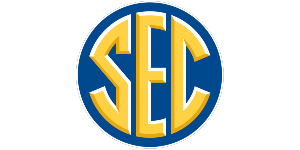Analyzing the Rise of Georgia Men’s Swimming To National No. 2 Ranking
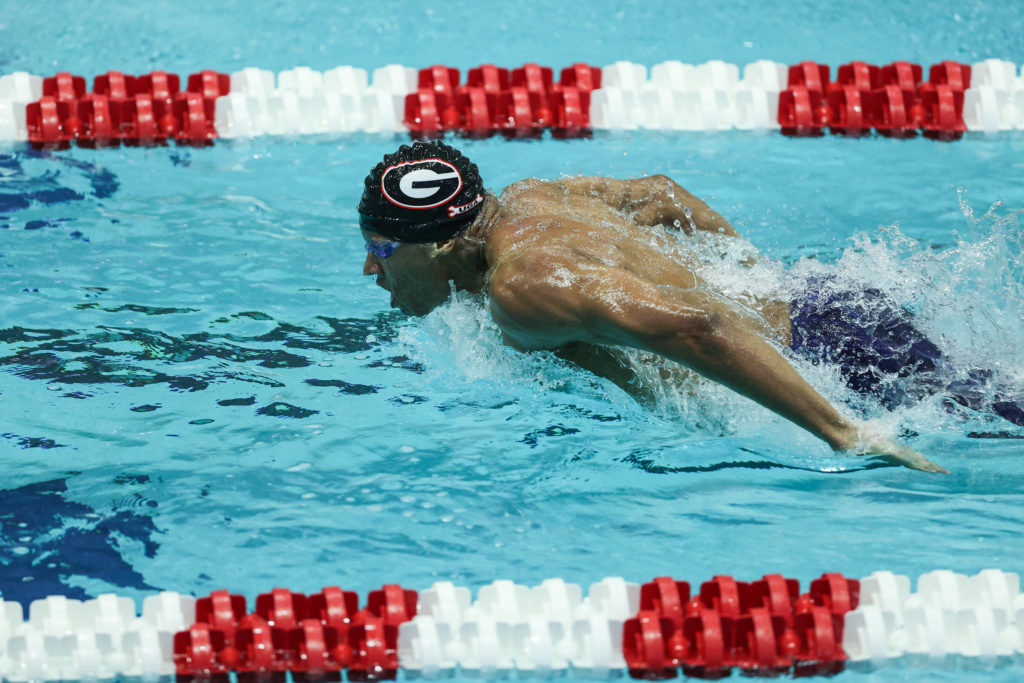
Analyzing the Rise of Georgia Men’s Swimming To National No. 2 Ranking
Jack Bauerle is well renowned as one of the top coaches in the United States with his work at the University of Georgia . Bauerle, also a U.S. Olympic coach, has won seven national titles on the women’s side at Georgia where he has been the head coach of both men and women since 1983, first leading the women in the fall of 1979.
Since first winning the 1999 women’s title, Georgia has been in the top two a total of 15 times in the last 21 years, developing NCAA individual champions like Kristy Kowal, Maritza Correia, Kara Lynn Joyce and Olivia Smoliga.
The men have had good success under Bauerle, but have not been higher than third since 1997. Although top ten finishes are nothing to scoff at, the Georgia men have not been as dominant as the women, although they have produced their fair share of good swimmers. Twelve different men have won individual titles under Bauerle, compared to 15 total women, most recently Chase Kalisz winning the 400 IM in 2017.
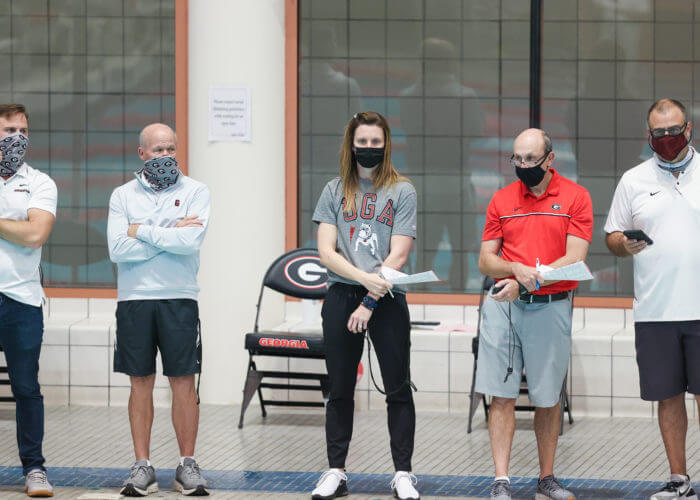
Georgia’s coaching staff. Photo Courtesy: Chamberlain Smith / Georgia Athletics
This year however, the Bulldogs look like they might have their best team in a long, long time. Again, the Bulldogs’ highest finish in school history was third in 1997, and they have been as high as fifth in 2014 and 2016.
This year, the team is ranked second in the latest CSCAA dual-meet poll with six weeks until the NCAA meet. Texas has established itself as the favorites this season, with Georgia and Cal Berkeley as the top challengers. Of course, the Golden Bears haven’t been able to show their cards this season due to California COVID laws, and no one in NCAA swimming is counting out the defending champs from 2019. But on paper, the Georgia men look stronger than ever thanks in part to a strong incoming freshman class as well as a mix of returning veterans that have meshed well within the team.
There’s a lot of streaks that could get broken for the Georgia men this season: They haven’t won the SEC men’s title since 1955 and they haven’t won a relay at SECs since 1961. Bauerle’s men’s teams have been second at SECs a total of four times (1992, 1998, 2015 and 2017), but have not cracked through to the top since Bauerle took over. Florida has won every SEC men’s meet since ending Auburn’s streak in 2013, and the Gators are still the team to beat. Georgia did beat Florida earlier this season in a dual, but an SEC title is a tall task.
Freshmen Luca Urlando and Jake Magahey, who were decorated junior swimmers in high school, have been big boosts for the Georgia men, as well as returning Olympic redshirt Javier Acevedo. Senior Camden Murphy was fighting through an injury at SECs last year, and Andrew Abruzzo was just coming into his own in his sophomore season before the pandemic after he also had a strong high school career.
“I’m not swimming for myself but for other people and trying to be a role model for the people in the classes below me,” Camden Murphy told us earlier this year. “I am trying to keep everyone happy and train the best that I can and try to help everyone the best that they can. If we do get to the end of the season, I think we will have a really good meet.”
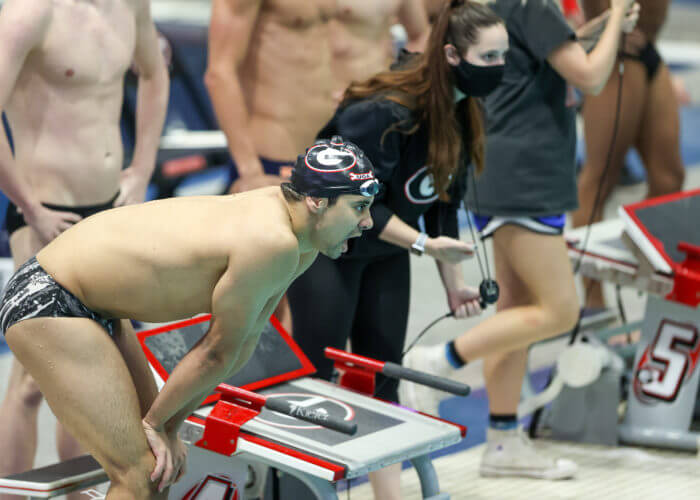
Javier Acevedo has performed well this season for Georgia men’s swimming and diving. Photo Courtesy: Chamberlain Smith / Georgia Athletics
Last year, the Bulldogs were seeded to finish 17th at NCAAs with 10 qualifiers. Of course adding Urlando, Magahey and Acevedo isn’t an automatic jump to the top four. It isn’t surprising the freshmen have contributed – Magahey was a national public school record holder in the 500, and Urlando was the national champ in the 200 fly.
Swimmers like Jack Dalmolin, Ian Grum, Greg Reed and Dillon Downing, who are all ranked in the top eight nationally in at least one event, have contributed to Georgia’s rise as a top two program on the men’s side.
Georgia has been lucky in the regard that they have been able to swim in more meets during this season, but that does not discredit their swims this year. The Bulldogs are legitimate contenders in the SEC, thanks in part to their tremendous efforts in recruiting as well as the improvements across the board in the weaknesses such as relays.
Urlando and Magahey have book-ended the 800 free relay to put them third nationally and on top of the conference. Even with Florida’s players Kieran Smith and Trey Freeman still posing a big threat in that event, this is a strong 1-2 punch the Bulldogs have for the next three years.
Acevedo and Murphy have helped almost revive the Georgia sprint group to lead the nation in the 200 and 400 free relay, events that Georgia hasn’t historically been particularly strong in. Acevedo is sitting third nationally in the 200 IM and fourth in the 100 back, while Murphy leads the rankings in the 100 fly, leaving the Georgia medley relays without a weakness. Dalmolin has improved drastically this season to sit in the top eight nationally in both the 100 and 200 breast, while Downing is ranked eighth in the country in the 100 free.
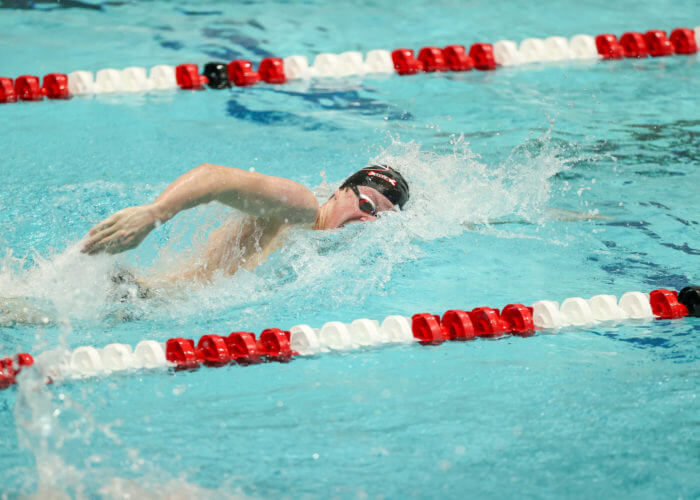
Jake Magahey is currently the national leader in the 1650 this season for Georgia men’s swimming and diving. Photo Courtesy: Chamberlain Smith / Georgia Athletics
The closest Georgia got to winning an SEC relay on the men’s side within the last ten years came in both medley relays at the 2014 meet in their home pool. This season, the medley relays may be their best shot at a conference relay title, although they don’t seem to have a weak relay this season.
Of course dual meet polls are one thing. Doing it at the end of the season at NCAAs is another. But Bauerle has been here before, and has proven time and time again that he can get swimmers to the top of the podium at the big dance and SECs. Again, since taking over in the fall of 1983, Bauerle has coached 12 men to individual titles, with names like Kalisz, Olympian Gil Stovall, and Sebastien Rouault winning titles.
The last thing he is missing from his illustrious career is a men’s team in the top four, and an SEC men’s title. Could that happen this year? Potentially. And this seems like the perfectly-meshed team to do so.




